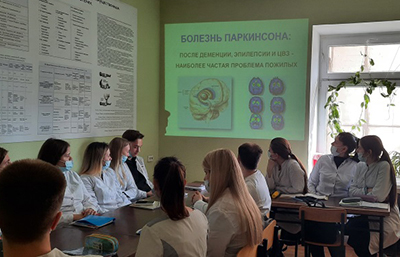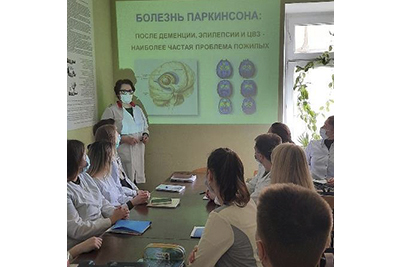

On April 11, at the initiative of the World Health Organization (WHO), World Parkinson Day is held annually.Described in detail 200 years ago, for scientists and doctors it still remains a mystery, and for patients and their relatives it is an exhausting and painful experience. This day aimed to raise the notification the citizens about this disease, to support patients and their families, and to contribute to overcoming the disease.
The date of the World Day was chosen not by chance: on April 11, 1755, James Parkinson (1755-1824) was born, an English doctor and researcher who first described the disease that now bears his name. His most significant research on medicine was “Essay on trembling paralysis” (1817). Having described six cases of the disease (and he just happened to meet three of these patients on the street), James Parkinson was able to identify the leading symptoms and tried to find the causes, mechanisms of the disease and even suggest methods of its treatment.
Parkinson disease is a slowly progressive chronic neurological disease that occurs due to abnormality of the production of dopamine by brain cells, which leads to motor disorders.
The typical symptoms of Parkinson disease includes: bradykinesia (slowness of movements); muscular rigidity (a painful condition characterized by their great tonicityand resistance when trying to make a passive movement); resting tremor (tremor which occures at rest and disappears when moving, resembles a “coin count”).
Besides the motor disorders such conditions as depression, sleep disorders, anosmia and cognitive defects(decreased memory, attention) are detected when Parkinson disease.
Parkinson’s disease is the second most common neurodegenerative human disease after Alzheimer’s disease. The total prevalence of Parkinson’s disease in the world is approximately 200 cases per 100 thousand population.
In total, about 10 million people suffer from Parkinson disease in the world. In Russia – about 210-220 thousand people.
The incidences of Parkinson’s disease increase with age, but about 4% of people suffer from it before the age of 50.
Men are 1.5 times more likely to have Parkinson disease than women.
The disease is rarely inherited. Scientists believe that the disease occurs due to a combination of internal and external factors, including unfavorable ecology, the influence of pesticides and herbicides as well as industrial chemicals.
For Parkinson disease treatment specified medicines are prescribed that stimulate the production of dopamine in the brain, or replace it, thus improving the condition of patients. As a result, people with this disease can maintain activity and cognitive capabilities for many years. In the late stages neurosurgical intervention can be applied that implant the brain with electrodes that are affected programmatically.
The disease can be developed for five to eight years before a person notices that his condition has changed. That’s why it’s important to detect the symptoms of Parkinson disease at early stages.When first symptoms of the disese appear (constipation, sleep problems, anosmia) a visit to the doctor should not be postponed. Early treatment improves the prognosis of the disease: reduces the severity of symptoms, slows down the progression of the disease, improves the quality of life.
Patients should not blame their illness for all the problems. The Parkinson Foundation draws attention to the fact that headaches, loss of sensitivity or muscle strength, chest pain are not typical for this disease. Patients should be well-informed of the sympthoms of the disease. Though it is a serious illness but it is not a death sentence. Much depends on the quality of the care provided and the care received.
The victims of Parkinsonism became such famous personalities as boxer Mohammed Ali, politician Yasser Arafat, Pope John Paul II.
On the day of the fight with Parkinson’s disease, round tables were held at the Department of Neurology and Neurosurgery among 4th year students of the Faculty of Medicine and clinical residents.
The staff of the department takes an active part in the diagnosis and treatment of patients with Parkinson’s disease within the framework of the Department of Planned neurology and polyclinic admission of KOMKB.

